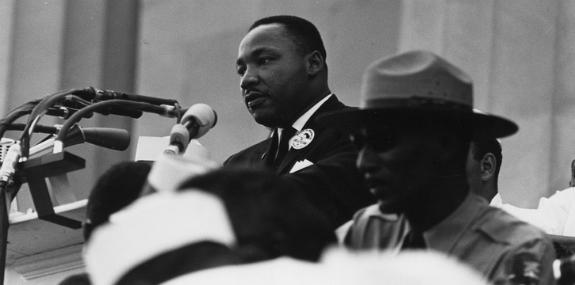
- Details
- By Chuck Hoskin Jr
Guest Opinion. As we come together this Martin Luther King Jr. Day, I hope we can all reflect on his life and ideals. Setting aside a day to honor him is a crucial step toward making Oklahoma and America a better place for all of us, regardless of race, gender, religion, orientation, or socio-economic standing.
Dr. Martin Luther King Jr.'s advocacy left an indelible mark on our nation, inspiring positive change from the community level to the highest levels of government. Indian Country and all of the United States benefited greatly from MLK’s call for justice, not just for a select few but for every citizen. His remarkable gift of words, both written and spoken, continues to inspire millions who share the dream of hope and fairness.
I am honored to be the annual Parade Marshal in Tulsa for the 2024 celebration. Tulsa’s MLK Parade is one of the largest in the entire country, and rightfully so. It is a time for Native people to join Americans of every color in learning how we can work better together. Dr. King talked about the arc of history bending toward justice, but it only bends if we bend it.

I am proud that Cherokee Nation can be part of achieving justice and equal rights for all. Dr. King’s ideal of inclusion for all is manifested in the tribe’s embrace of Cherokee Freedmen, descendants of former slaves, as tribal citizens. Beginning in 2017, we honored the treaty promise to those citizens. We have since created a task force to preserve and promote Cherokee Freedmen art and history. A historic exhibition was launched at the Cherokee National History Museum to tell the story of their struggle, perseverance and reconciliation. That exhibit continues to travel and offer a unique learning opportunity and insight into our tribal history.
In 2020, I signed an executive order that ensures all Cherokee citizens are to be regarded as “equals under the law, irrespective of descendancy, race, gender, disability, national origin, religion, sexual orientation, or any other legally protected status,” and discrimination on these grounds is unlawful and incompatible with Cherokee values. Dr. King’s dream of a society where individuals are judged by their character rather than their outward characteristics resonates with the Cherokee Nation's commitment to treating all citizens equally.
The MLK holiday is widely associated with a call for a "Day On, Not a Day Off." It’s a reminder to look for ways to actively serve our community. In that spirit, we recently instituted a new program for tribal citizens to commit to public service for the greater good. Called Gadugi Corps, this Cherokee Nation program enables us to better engage in real volunteerism and care for others.
The Cherokee Nation is moving closer to Dr. King's vision and legacy. On MLK Day and every day, we carry forward the torch of unity, inclusion and service that he inspired. I am inspired by and grateful to all those who carry it with us.
Chuck Hoskin, Jr. is the principal chief of the Cherokee Nation.
More Stories Like This
Tribal IDs Are Federally Recognized. ICE Agents Are Ignoring Them.Thanksgiving: Part of "Broken Circle Holiday"
Thanksgiving is a Tradition. It's Also a Lie
Decisions About Us, Without Us: Education Dismantling Ignores Tribal Nations
What the Seismic Shift in Indian Education Could Mean
Help us tell the stories that could save Native languages and food traditions
At a critical moment for Indian Country, Native News Online is embarking on our most ambitious reporting project yet: "Cultivating Culture," a three-year investigation into two forces shaping Native community survival—food sovereignty and language revitalization.
The devastating impact of COVID-19 accelerated the loss of Native elders and with them, irreplaceable cultural knowledge. Yet across tribal communities, innovative leaders are fighting back, reclaiming traditional food systems and breathing new life into Native languages. These aren't just cultural preservation efforts—they're powerful pathways to community health, healing, and resilience.
Our dedicated reporting team will spend three years documenting these stories through on-the-ground reporting in 18 tribal communities, producing over 200 in-depth stories, 18 podcast episodes, and multimedia content that amplifies Indigenous voices. We'll show policymakers, funders, and allies how cultural restoration directly impacts physical and mental wellness while celebrating successful models of sovereignty and self-determination.
This isn't corporate media parachuting into Indian Country for a quick story. This is sustained, relationship-based journalism by Native reporters who understand these communities. It's "Warrior Journalism"—fearless reporting that serves the 5.5 million readers who depend on us for news that mainstream media often ignores.
We need your help right now. While we've secured partial funding, we're still $450,000 short of our three-year budget. Our immediate goal is $25,000 this month to keep this critical work moving forward—funding reporter salaries, travel to remote communities, photography, and the deep reporting these stories deserve.
Every dollar directly supports Indigenous journalists telling Indigenous stories. Whether it's $5 or $50, your contribution ensures these vital narratives of resilience, innovation, and hope don't disappear into silence.
 The stakes couldn't be higher. Native languages are being lost at an alarming rate. Food insecurity plagues many tribal communities. But solutions are emerging, and these stories need to be told.
The stakes couldn't be higher. Native languages are being lost at an alarming rate. Food insecurity plagues many tribal communities. But solutions are emerging, and these stories need to be told.
Support independent Native journalism. Fund the stories that matter.
Levi Rickert (Potawatomi), Editor & Publisher
